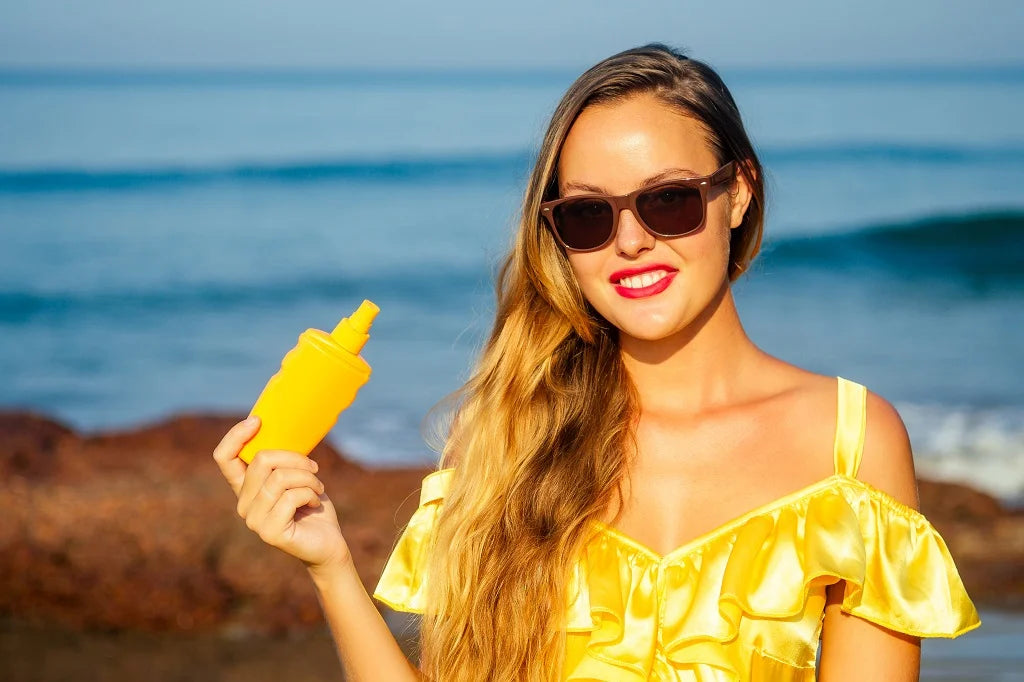
Some Sunscreen Questions Answered For You!

Dr. Deepthi Prasad, MBBS.
Written by Our Editorial Team
Do you also agree that summertime is the best time of the year? It is all about beach trips, outdoor adventures, and wearing short dresses. But the fun time also comes with the fear of sun damage. Worry not! Now you can enjoy your moments under the sun with sunscreen. Let's discover how sunscreen can be your best friend this summer.
The Sunscreen Scene

Source : Freepik
Have you ever wondered how to enjoy the sunny days without fearing skin damage? You can do that by welcoming sunscreen into your skincare routine. It is a secret lotion that helps in enjoy sunny days without worrying about the sun's harmful UV rays.
Isn't it exciting that it has many forms like sunscreen lotion, spray, gel, foam, stick, etc, designed to prevent sunburn and skin damage? Also reduces the risk of skin cancer by protecting the skin from UVA (aging rays) and UVB (burning rays).
1. How Much SPF Is Mandatory?

Source : Freepik
Ever wondered why sunscreens have numbers like SPF 15 or SPF 30? These numbers will tell how well they will protect your skin from the sun. SPF is like a sun defense rating.
Generally, SPF 30 is a great choice for many people as it offers 97% protection from UV rays. Sunscreen SPF 50? It adds a little extra shield. So really, there is not much difference. When it comes to your face, SPF 30 is the best choice as it protects the skin from sun damage and also reduces the chances of skin cancer.
Also Read : SPF : What Is It? What Are It's Types?
2. How Much Sunscreen Should I Use On My Face?

Source : Freepik
The amount depends on your face size and the product. Cover the areas that are exposed to the sun with sunscreen. There are many ways to measure sunscreen. Some of them are:
- Treat your skin as a sundae and sunscreen as toppings. Use ⅓ or ¼ teaspoon of sunscreen to cover it, as if you are topping the sundae.
- The 3 finger-length technique is very popular these days. Apply sunscreen that measures up to 3 finger lengths to your face.
- For the whole body, use a shot glass (no drinking involved here). Fill it with sunscreen. It's the right amount to protect your body from sun damage
3. Should I Use A Sunscreen Gel Or Sunscreen Cream?

Source : Freepik
Sunscreen gel like Thrive Co's Ultra Light Sunscreen gel with SPF 50, is the perfect sunscreen for oily and acne-prone skin. It is light in weight, which makes it easier to get absorbed by the skin, fights Sun's aging, and won't clog pores. Powered by 33 kDa Hyaluronic acid and Polyglutamic acid, it gives the benefits of sun protection and skin hydration.
Buy ThriveCo's Ultra Light Sunscreen Gel
On the other hand, sunscreen cream is a good choice for those dealing with dry skin. It provides deep moisture to your skin. The only problem with sunscreen cream is that it leaves a white cast and takes a longer time to get absorbed into the skin.
Also Read : Sunscreen Gels Vs Creams: Which One Should You Pick?
4. Who Needs Sunscreen?

Source : Freepik
Exposed to the sun? If yes, you need sunscreen, as it helps prevent skin cancer by protecting the skin from the sun's harmful UV rays. Skin cancer is very common, and anyone can get it irrespective of age, gender, skin tone, and skin type. Not only during summers, UV rays can also reach your skin during cloudy days and winters. So no matter what season, never exclude sunscreen from your skincare routine.
5. What Type Of Sunscreen Should I Use?

Source : Freepik
Looking for the best sunscreen? Learn your skin type first, then choose the one that provides complete protection from UVA and UVB. Is sunscreen SPF 50 or 30, and is water resistant? Some of them are:
- Planning on abandoning sunscreen due to participation in an activity that involves water? Do not make this mistake! Go for water-resistant sunscreens.
- Sunscreen creams are like cozy blankets for dry skin and are your go-to for the face
- Have oily and acne-prone skin? Gels are your saviour. They are the best choice if you have oily skin as they have water-like texture and do not clog any pores.
- Great tools for sun protection are sunscreen sticks. They are fantastic for applying around sensitive areas like eyes for proper coverage.
- Sunscreen Sprays are parents' favorite for kids, as the application is very easy. The only problem is that it becomes difficult to know if you have used enough sunscreen to cover all exposed areas.
6. Is It Okay To Skip Sunscreens In Winter?

Source : Freepik
Sunscreen is not just your summer fling. It is your bodyguard for the entire year to protect you from the villain called UV rays. This villain causes skin cancer, and guess what? It does not discriminate against people on the basis of age, gender, skin tone, and skin type. It is a troublemaker for all.
Firing your bodyguard during the winter season will be your dumbest decision, as the sun rays during winters may not feel as warm or harsh as they do during summer, but its UV rays do continue to break down your skin cells, resulting in premature ageing.
7. Is Sunscreen Safe For You?

Source : Freepik
Sunscreen is like an invisible shield on your skin, protecting it from the sun's harmful UV rays, reducing the risk of skin cancer, preventing sunburn, and decreasing the early signs of skin ageing. Before use, read the instructions given below and reapply it whenever required based on the exposure of the sun. To conclude, yes, sunscreen is safe.
Also Read : Choose A Sunscreen That Suits Your Skin
No matter what the season, the sun will damage your skin. In order to protect it, add the best sunscreen for face in your skincare routine. Because your skin deserves the best.
About Doctor :

Dr. Deepthi Prasad specializes in Dermatology, Cosmetology, and Aesthetic Dermatology and has been practicing for over 15 years. After completing MBBS from Dr. NTR University of Health Sciences Andhra Pradesh in 2009, she earned a MD in Dermatology, Venereology & Leprosy from Osmania Medical College in Hyderabad in 2014.
Disclaimer: All the content published on www.thriveco.in is solely for information purposes. It is not a substitute for professional medical advice, diagnosis, or treatment. Always consider seeking the advice of your physician or a qualified healthcare provider. The information, suggestion, or remedies mentioned on this site are provided without warranty of any kind, whether express or implied.
 EXTRA 15% OFF. Coupon PAYDAY
EXTRA 15% OFF. Coupon PAYDAY 








